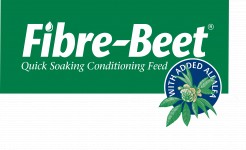Posted: 21st August 2017 | Back to news feed

EXPERIENCED horse trainer Nichola Reinhard from Ireland knew all about the benefits of Fibre-Beet when she studied horse management and breeding at Kidalton College in County Kilkenny, but little did she know she’d end up using it to save a sick black rhino in Namibia.

Nichola came to the Kuzikus Wildlife Reserve in Omaheke, Namibia in 2010 as a volunteer to take guests out on horse riding safaris on the edge of the Kalahari.
While volunteering, Nichola met her now husband Berend Reinhard, who is the Managing Director and Biologist at the private game sanctuary, where the family combine tourism, education and research directly with conservation projects.
In 2012, the family rescued an orphaned four-month old rhino calf, which they hand-reared themselves – with Nichola even sleeping in his stable to begin within - until Johan the goat joined the team as his companion.
Now aged four, Kiacho (known as Baba), was reintroduced to the park and was fending for himself, but bullying from other rhinos caused Baba to lose a great deal of weight due to being forced off the good grazing areas, and eating the wrong plants caused him to colic.
Realising he needed help from his human family, Baba came back to the sanctuary himself, and the team realised they had to act fast to save him and called the vet.
Together they made a plan of slowly getting food back into him and building up his condition to avoid further colicing, which is when Nichola thought to try Fibre-Beet.
“I made up a bucket of Fibre-Beet mixed with Speedi-Beet and some game pellets,” Nichola explained. “I showed the vet, who hadn’t heard of the feed before, but after checking the ingredients she agreed it was fine for him to eat. Rhinos are actually related to the horse and have similar digestive systems - both can suffer from colic.

“So, over the next few days I was feeding little but often feeds of Fibre-Beet mixed with game pellets and a probiotic. This is all he was eating and he could barely stand up. We even had to pour water over his head to wake him up to eat every hour or so, but the Fibre-Beet kept him going, and most importantly kept the digestive system moving and slowly built up his energy so he could eat browse again - the main source of food for black rhinos. It took us three days of this kind of feeding to get him going again, but it worked and now he's eating all around him, just a bit on the skinny side but looking much better already.”
She added: “The reason I knew to feed him like this is because the trail riding horses we have here suffer when we have drought, and often get colic because they eat the wrong things when there isn’t much grass around. One of our horses had the same problem as Baba last year and I also fed him this way when he coliced. I honestly think the fact I had the Fibre-Beet is what really saved him. If I didn’t have it the horse at least would have died and the rhino would not have recovered so quickly.”
Will I’Anson of British Horse Feeds said: “We are so pleased to hear Nichola’s story about Baba the rhino. Fibre-Beet and Speedi-Beet are both suitable to feed to horses with colic and can help with digestive issues. We wish Baba a speedy recovery and hope he’s out and about in the reserve soon.”
A Super-Fibre conditioning feed, Fibre-Beet is a formulated blend containing all the benefits of the original Speedi-Beet product, with added high-quality Alfalfa for optimum condition and to provide quality protein for muscle tone and function.
Fibre-Beet is a carefully designed blend of highly degradable fibre sources that provide optimum fermentation patterns to help keep the digestive system healthy.
High levels of pectins and surfactants can help maintain the mucus linings of the gut whilst the structural fibre absorbs excess stomach acid - helping combat the conditions for ulceration and other stress symptoms.
Fibre-Beet is fermented to produce high levels of butyric acid, which aids the function of the cells of the gut wall, and low levels of lactic acid, making it an ideal alkaline feed. With an effective degradability 50% higher than forage fibre, Fibre-Beet can improve energy intake whilst keeping dietary fibre levels at an optimum.
Fibre-Beet also provides a good range of minerals, trace elements and amino acids and it has a low sugar content.
Ideal for horses prone to digestive upsets and very palatable for fussy eaters, Fibre-Beet has added biotin for hoof quality and is suitable for laminitics.
Soaked and ready to feed in only 45 minutes in cold water, or 15 minutes in warm water, the RRP is £12.35 - £13.30.
For more information on Fibre-Beet please contact British Horse Feeds on 01765 680300 or visit www.britishhorsefeeds.com.
For more information on Kuzikus visit http://www.kuzikus-namibia.de/xe_index.html or follow their Facebook page at Kuzikus Wildlife Reserve.
The Equestrian Index newsfeed is compiled from articles submitted by advertising members and expresses the opinions of those members. Watsons Directories Ltd shall not be held liable for any inaccuracies or mis-statements therein.
